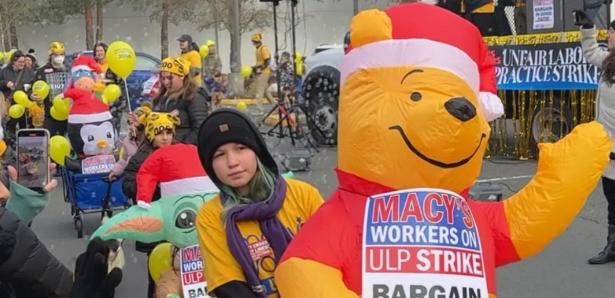Fans of the Macy’s Thanksgiving Parade may have noticed one glaring omission in its cast of charismatic balloons and floats: Scabby the Rat, who for some reason, has never been invited.
But what employer wouldn’t want a reminder from Scabby—“an imposing 12-foot inflatable rat, replete with red eyes, fangs, and claws,” as the National Labor Relations Board puts it—to stay on its best behavior?
Macy’s workers in northwest Washington rectified this last year by prominently featuring Scabby when they launched a strike and boycott campaign against the retailer over low wages and safety issues. Scabby was also the star of their own mock Thanksgiving Parade.
Members of Food and Commercial Workers (UFCW) Local 3000 had been working under an expired contract since last March.
“What many shoppers may not realize is that a lot of us store workers can barely afford to cover our health care premiums, on top of housing, food, gas and other basic needs on the low wages we are paid,” said Nicole Hardin, a 17-year Macy’s employee who works at the cosmetics counter and who served on the local’s negotiating team.
Hardin was one of over 400 Local 3000 members who went on a three-day unfair labor practice (ULP) strike in November. They walked out of Macy’s stores at three area malls on Black Friday, the infamously busy shopping day.
SURPRISE STRIKE
The workers then began a second indefinite ULP strike on January 15, which ended nine days later when management finally moved on key issues such as ending retaliation against workers for calling 9-1-1 over security concerns in stores.
Members voted by 97 percent to accept the tentative agreement, which also included improved wage scales for new hires, protection of the Martin Luther King Jr. holiday (which Macy’s had tried to take away), backdated raises for workers, and a significant ratification bonus.
Morale on the picket line was high. Hardin said, “I was surprised at how happy everyone was to be out there to fight. It was like recess.”
Hardin said customers responded well to the boycott, which was extended to 12 stores across Washington and Idaho. She estimated that only 10 to 15 percent of customers entered the store after being asked to turn around. Over 20,000 supporters signed a petition pledging to not shop at Macy’s.
Workers prepared for the strike by all wearing buttons on the same day and passing out strike countdown stickers. But the company undermined the Black Friday strike by paying to fly in and house out-of-state scab workers. The January strike, however, took management by surprise.
A local bump in strike pay also helped. Local 3000 approved up to $200 to $800 in weekly strike pay, depending on how many hours workers put in on the picket line. The money came from the local’s strike fund, which it has spent years building up. The strikes were too short to get payments from the international, which pays strikers $250 a week from day eight.
ADVOCATING REFORM
Local 3000 is the largest local in the UFCW with 50,000 members in grocery, retail, and health care. It has been the most prominent local advocating reform of the union, backing the campaign by Essential Workers for Democracy (EW4D) for direct elections of top international leadership (“one member, one vote”) and coordinated bargaining for employers such as Kroger across hundreds of different contracts.
At the UFCW International Convention in 2023, EW4D succeeded in making strike pay start accruing on day eight rather than day 15. They weren’t able to win strike pay calculated from day one, as reformers did recently in the Auto Workers and the Teamsters.
Reform-minded leaders had also tried to coordinate organizing and bargaining among all the UFCW locals representing Macy’s workers, but these plans were scuttled by the international union, according to a supporter of EW4D familiar with the efforts.
Hardin said there are still challenges to address at her workplace, such as the need to continually rebuild the culture of the union due to high turnover. However, she said she feels that the union is now in a better place because of the strike. Hardin said they recognize that “if we do have solidarity, we have a bigger voice.”

Lisa Xu is an organizer with Labor Notes.


Spread the word